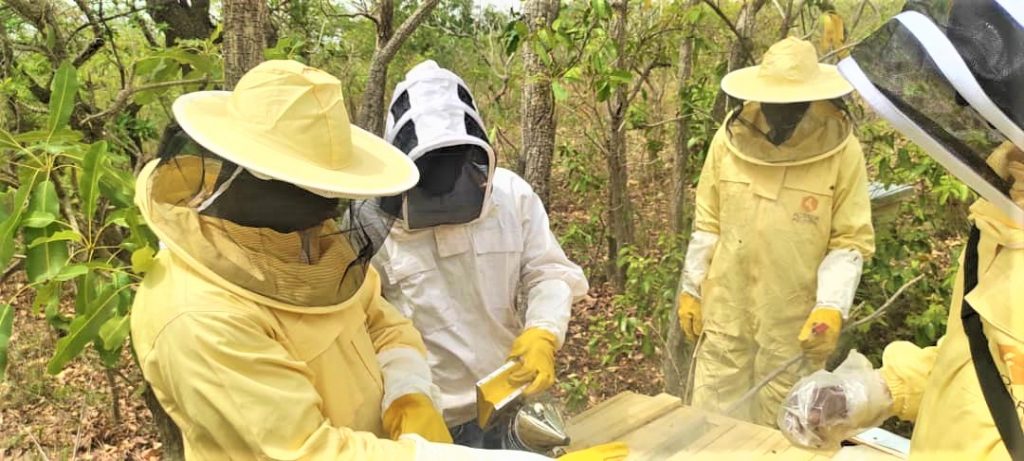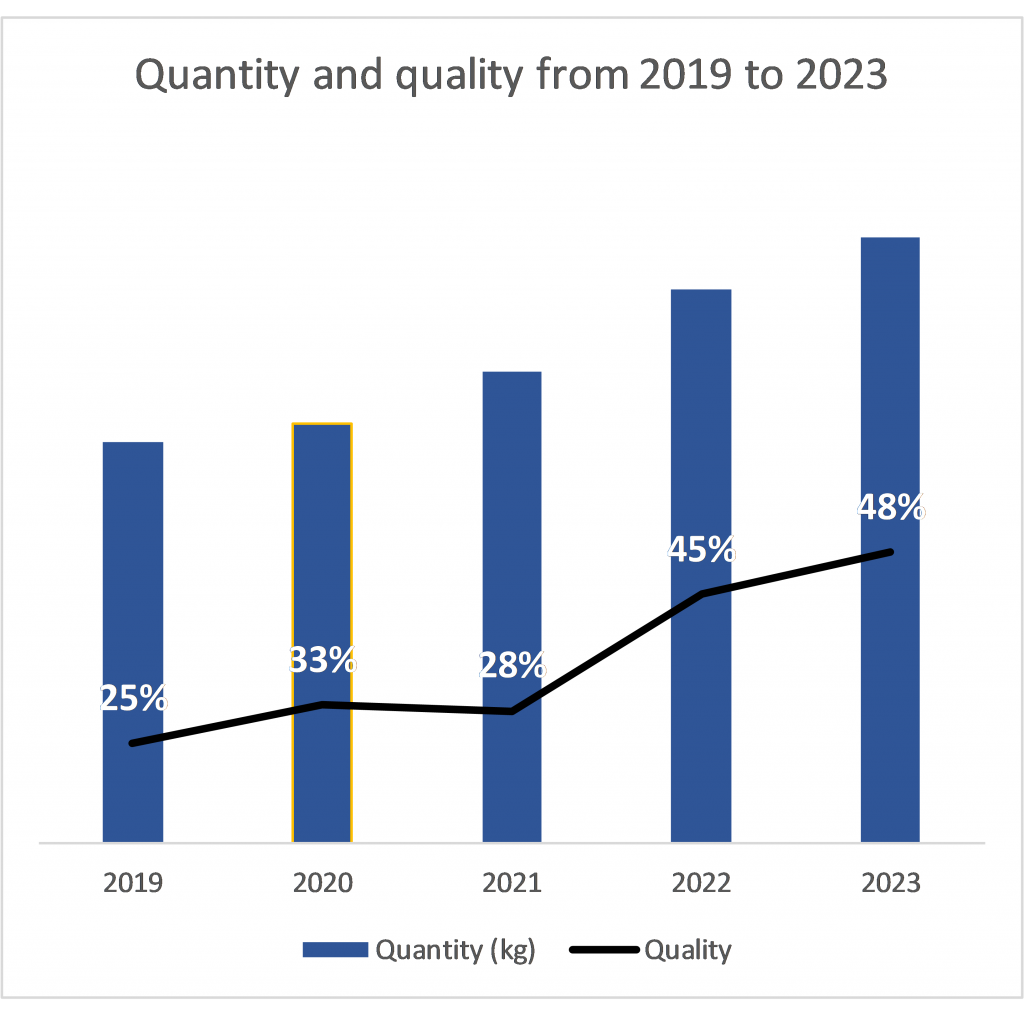“USAID/Trade Hub partnership was an accelerator to scale our social but profitable business model across West Africa to make KKWA self-reliant, meet customer need through export, notably to the U.S., benefit farmers, and improve biodiversity.”
Sylvain John Cattin, MD KKWA

KKWA’s professionalizing over 1,200 beekeepers in eight countries in West Africa includes equipping them with the required personal protective equipment (PPE) to perform their duties more effectively and safely.
In 2019, Koster Keunen West Africa (KKWA) identified a significant market opportunity within the West African beekeeping industry that would prove to be life-changing for individuals like Waïba Agoro, a twenty-one-year-old woman from Togo’s Central Region, and thousands of others. Fueled by a vision for sustainability and community empowerment, KKWA began an investment journey that brought opportunities and access to over 10,042 beekeepers, including Waïba and 2,484 other women from 928 at the start of the project.
Valued at over $150 million per year, the West African market for locally-sourced beeswax held massive potential, as there was a lot of unmet demand from the region. However, for KKWA, a company built on putting quality and caring for people and the environment at the forefront, there were hurdles to overcome before the investment could be profitable.
Initially, a major issue was that both the quality and quantity of the beeswax produced in the region were subpar. Many beekeepers were not aware of the economic value of producing beeswax for the international market. The number of hives owned by beekeepers was short of the ideal amount needed to meet demand and the methods of maintaining and harvesting the beeswax led to a dark, dirtied product.
Also, culturally, beekeeping was perceived as a dangerous activity. With hives being high in trees, the threat of bee stings, and many duties being performed during the dark nighttime hours, many people, especially women, were discouraged from participating in it.
A key factor in KKWA’s ability to successfully face some of those hurdles was its collaboration with the USAID West Africa Trade & Investment Hub (Trade Hub). As part of the Trade Hub’s goals to support West African businesses to create inclusive jobs and build sustainable export supply chains between the United States, Africa, and other international markets, it provided a $1.78 million co-investment grant to KKWA. The co-investment project aimed to empower smallholder farmers, especially women and youth, by introducing beekeeping activities as a secondary source of revenue to 1,200 new farmers (predominantly cashew and mango farmers), significantly increasing those farmers’ incomes across West Africa.
This grant partnership, which also included technical assistance to the firm, had a projected impact of installing 36,000 new hives; training smallholder farmers (20 percent women) in sustainable and organic practices; and professionalizing beekeeping for 1,200 new farmers—meaning they received best practices training to successfully manage at least 30 hives and to appropriately utilize the provided personal protective equipment (PPE) and tools. This professionalizing empowers beekeepers to produce quality products in quantities that build sustainable businesses. To improve efficiency and profitability, the project objectives also included acquiring new equipment and digitalizing supply chain operations.
Strengthening the economic reward of beekeeping for beekeepers and farmers in the region is proving to be a sensible and rewarding solution to meeting demand. Waïba was able to benefit from the project early on, receiving the support and training that is allowing beekeepers to realize increased profits—especially from the beeswax that was previously discarded. Further, the project is allowing farmers to have improved yields due to pollination by the bees and is also leading to additional income from beekeeping products with improved product quality and access to premium international markets.
Waïba experienced benefits firsthand, including improved skills and increased income, in her first year of participation. This was evident in the doubling of her honey and beeswax production, along with enhanced quality and higher returns. Being empowered with new skills and equipment—as well as training to maximize their effectiveness—fueled Waïba’s desires to continue to expand her business and make plans for a brighter future, including doubling the number of beehives she managed.
In 2022, Sylvain John Cattin, KKWA’s Managing Director, participated in a Trade Hub webinar, “From Farm to Beehive: Why Introducing Farmers to Beekeeping is a Win for Farmers, Agribusinesses & the Environment.” He shared, “The partnership has enabled us to develop a sustainable beekeeping supply chain across two new countries in West Africa and strengthen our position in six existing countries at a faster speed and scale than we had anticipated, which in turn improved the quality and quantity of exports, notably to the United States, and so providing alternative and additional incomes to farmers.”
Leveraging on this collaboration with the Trade Hub, KKWA not only overcame the earlier hurdles, but the company also met and surpassed many of the other targets of the partnership. Today, over 36,000 hives have been installed across Benin, Burkina Faso, Mali, Nigeria, Togo, and Sierra Leone and Côte d’Ivoire, the two countries where KKWA was able to enter the market through its Trade Hub partnership. Ten thousand forty-two (10,042) beekeepers have been professionalized and have recorded increased yields and profits.
Fostering regional trade and partnerships, the Trade Hub linked KKWA to cashew company, EcoCajou in Côte d’Ivoire, another Trade Hub co-investment partner. This linkage has proven impactful, as in less than a year, the partnership has engaged 612 new beekeepers (including many smallholder cashew farmers who previously performed no formal beekeeping activities), placed 1,200 new hives in cashew orchards, and facilitated the purchase of 3.64 MT of beeswax valued at $18,867.
Cumulatively, since the grant’s start, KKWA exports have reached over $9.1 million, significantly exceeding the initial project target of $5.68 million. With the project’s export goal including the establishment of a sustainable regional export supply chain to the United States to take advantage of AGOA benefits, 72 percent of the total beeswax exports were exported to the United States. In volumes and values, that translates to 743 MT (worth $6,621,668) of a total of 1,021 MT (worth $7,408,668) of beeswax being exported to the United States.
Similarly, the annual production and sales of sustainable beeswax stand at 410.4 MT (metric tons) for over $2.96 million during the last fiscal year, demonstrating remarkable growth when compared to the 237.74 MT sold for $1.6 million before the start of the grant—almost two times the amount per year at the onset of the project. Also, the production of organic shea kernel is up to 1,062 MT, a big leap from the 562.6 MT produced initially. The partnership has led to the training of 10,042 smallholder farmers (25 percent women), roughly a four-fold increase from the 2, 484 trained at the beginning of the project.
Particularly reflective of KKWA’s commitment to the Trade Hub partnership’s goal of ensuring diverse participation in beekeeping, of the 10,042 beekeepers, 2,479 were women and 4, 374 were youth. This deliberate practice of inclusion has also been financially rewarding, as within the grant period, women generated $1.55 million of the $6.2 million total smallholder sales. Waïba’s journey is only one of the many women who have experienced immeasurable benefit due to her participation in KKWA’s vision for the region.
In a dynamic video KKWA produced to illustrate the full picture of its global impact and the journey to bring transformation to the region—including through its collaboration and innovation with the Trade Hub— Pitassa Hélène, a 29-year-old wife and mother of 3 children in Titigbe (Central region in Togo), shares a perspective that echoes the experiences of many of these women: “I am glad that I can be a beekeeper; I can make money as a woman. It gives me freedom to work and take care of my family. I am happy that I can give honey to my babies. It helps to keep them healthy, protect them from disease, and I can send my children to the school so they can learn.”
“The USAID/Trade Hub partnership was an accelerator to scale our social but profitable business model across West Africa to make KKWA self-reliant, meet customer needs through export (notably to the U.S.), benefit farmers, and improve biodiversity,” Cattin shares. “We want to have a long-term commitment to the beekeeper and to show them that this is an activity that can be professional, and they can make good income…but to do it the right way… to respect the environment and the bee colony.”

{Sustainable supply chain }

